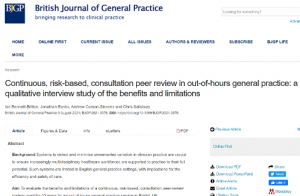GP consultation peer review may help reduce unnecessary variation in how patients are treated
11 August 2021
Continuous, risk-based peer review of out-of-hours GP consultations may help identify and reduce unnecessary variation in how patients with the same problems are treated, a new study published in the British Journal of General Practice (BJGP) has found. The researchers based at the Centre for Academic Primary Care at the University of Bristol, ARC West, and Cardiff University, interviewed clinicians, peer reviewers and healthcare managers from an organisation with 10 years of experience using such an approach to inform their findings.
Effective systems to detect and reduce unnecessary variation in how healthcare professionals treat patients are important to ensure and improve the efficiency and safety of care. However, the use of such systems is presently limited in general practice settings.
This study aimed to evaluate the benefits and limitations of a continuous, risk-based, consultation peer-review system which had been used for 10 years by an out-of-hours general practice service in Bristol. Researchers interviewed 20 clinicians between September 2018 and January 2019.
Interviewees said the system of giving peer feedback helped health professionals learn, highlighting their learning needs and validating what they were already doing. It was compared favourably with existing structures to ensure professional competence, supporting standardised supervision, clinical governance and a learning culture.
There were some limitations to the system, such as variation in the quality of feedback, the efficiency of methods to identify learning needs, and limitations of assessments based on written clinical notes. Factors such as how experienced and motivated the healthcare professional was and the learning culture of their organisation influenced whether they saw the system as a help or a hindrance.
The general practice workforce is increasingly multidisciplinary, and these findings demonstrate the potential of continuous, risk-based, consultation peer review to support clinicians in this evolving context. The research team also developed a ‘programme theory’ to help others consider how they could adopt similar interventions within their own healthcare setting.
Dr Ian Bennet-Britton, a GP and Research Fellow at the University of Bristol, led the study. He said:
“Our study found that a structured way of regularly peer-reviewing the consultation notes of doctors, nurses and others who see patients in general practice, may help identify and reduce important differences in the way that clinicians deal with the same patient problems.
“In our paper we also offer a programme theory to help clinicians and healthcare managers make the most of the potential benefits of such an approach, whilst accommodating its identified limitations.”
Watch Ian’s video to find out more
Paper
